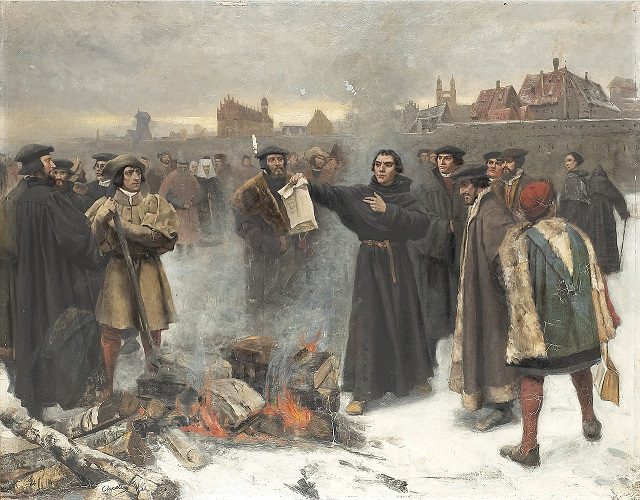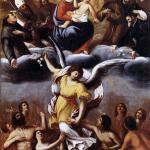
Catholics & Protestants tend to have very different views of Luther & of the nature & scope of Christian tradition.
Words of Steve (Catholic) will be in green. Words of Alexander (Calvinist) will be in blue.
***
This seems to be the summary of the argument between Catholic and Protestant views of Luther:
Catholic: Luther was a flawed and complex character therefore one should not trust his theological pronouncements and certainly not follow him out of the Church
That’s not my perspective (but there is some overlap). First of all, I am interested in Martin Luther, because I am interested in Church history, and particularly history of doctrine, and Luther is obviously a key figure in that regard. He is an influential figure; therefore it is worthwhile to better understand his reasoning and viewpoints. He’s also the founder of Protestantism. In my mind, it is self-evident why it is important to study Luther.
As to the sainthood bit, the Bible has definite, rigorous requirements for being a bishop. Luther in effect claimed much more for himself than that. He claimed to be a Reformer of the whole Church and restorer of the primitive purity of the gospel of the early Church. My Bible (over against the attempt of many Protestants try to rationalize and dismiss Luther’s flaws as irrelevant) tells me that wisdom and righteousness go hand in hand. This is why Catholic reformers are almost always saints as well, because a great deal of truth and wisdom is accompanied by strength of character, virtue, and sanctity, which God grants by His grace along with the truths that a person brings to light.
This being the case, I do think a certain problem needs to be faced. Luther founded Protestantism and gave it most of its distinctive doctrines and approaches. If we can show that he held a lot of dubious or untrue views, and curious reasoning, this is highly relevant, because (again, whatever Protestants say), he was the one who started the wheels of Protestantism in motion, and if the foundation is weak, chances are that the superstructure built upon it will be also.
Protestant: Luther was a flawed and complex character as we all are therefore we can take heart and learn from his struggles for sanctity and the solutions he came up with.
Protestants are so often blind to the pedigree of their own ideas. Studying Luther and Calvin (and Zwingli and Bucer and Bullinger and the early Anglicans, and the Anabaptists) helps all of us to better understand why and how Protestantism got to where it is today. Many Protestants like to play the game that they have no tradition at all, and that they are simply returning to the Bible, etc., etc. I could write for days about the resulting absurdities of this tunnel vision outlook.
The Catholic will play up Luther’s flaws to press his point while the Protestant will acknowledge the flaws but place them in the context of a greater interior spiritual struggle.
If they do it in the more sophisticated way I have been arguing, it is valid, I think. One can’t say, “see, Luther was a scoundrel; therefore, Protestantism is false.” That’s ridiculous. I don’t even argue that he was a scoundrel. I don’t believe it (though I have huge problems with some things he did and said). But it is a sound argument to say that “Luther had some goofy ideas which cannot be squared with the Bible, the early Church, or reason; therefore, we can question whether his views are automatically superior to the Catholic ones, a return to the early Church, more biblical, etc.” That moves the discussion to another more complex, nuanced (and I would say, “real”) plane, forcing the Protestant to re-examine his presuppositions (which they are rarely challenged to do).
In my opinion this argument will never go anywhere.
As you characterize it, you are right. But my own treatment of Luther is based on a much different rationale and premise.
To quote Louis Bouyer:
It is a typical mistake of Catholics to think that Protestants, particularly those most attached to their heritage, look on Luther as a saint… Luther is not looked on as a model in every detail of his life and teaching, but only in the manner which, at a certain period of his life, he resolved a particular spiritual problem.
Of course they don’t think he was a saint. They don’t get into saints, because they see that as a detraction from a focus on God, the giver of all holiness and sanctity (it isn’t, of course, anymore than appreciating a great painting is an insult to the painter). I used to be a Protestant, so I know this full well.
Luther was a great hero of mine. Many Protestants think the same (they do believe in heroes, if not saints). And he is the hero precisely because they think (to more or less degrees, depending on whether they are anti-Catholic or ecumenical) that he “rescued” Christianity from the darkness of Catholicism. He stood up to the great Beast and told it the truth. So he is very highly regarded by those who have any historical sense at all and sense of their own spiritual heritage.
For example, in my recent research, I recall a quote by a Protestant scholar who said that it was good that Luther had so many faults, because he was in danger of idolizing him — he admired him so much. This hit the nail on the head. It’s not a “veneration of the saint” thing, but it is most definitely a “tremendous admiration for the reformer of [so-called] corrupt Catholic Church” thing.
And because of this there is a lot of mythology and misinformation about Luther. This is another reason I do what I do. If the situation is such that all you hear about is all this wonderful stuff about Luther and hardly any criticisms, then there must be some balance.
My papers provide that by giving the other “side” of the story: the perception of the same man and the same life through Catholic eyes. That is a service to folks who care about these issues in the same way that a conservative political commentary balances a liberal one (this was expressed to me, in fact, by a Baptist pastor friend of mine who had a large impact on my spiritual life in the early 80s — he appreciated my work even though he disagreed because he wanted to hear how a Catholic thought about Luther, and why). Both sides have their natural biases, but by carefully considering both, one can perhaps figure out where the truth lies.
So again, the issue isn’t whether Luther was a saint or not (he clearly wasn’t! And he would be the first to admit that), so much as it is his basis for his radical innovations, and whether it is plausible to simply believe a man like him (indeed, any man) when he is in confrontation with a lot of received Christian tradition (and literally change Catholic dogmas because he denounced them). In any event, the bottom line is the ideas, not him. Are they true or false, and on what basis?
So in my paper on Luther and the biblical canon, I tried to demonstrate that it was outrageous to accept what he said over against tradition, and that he hardly had any reasoning in the first place to do so, other than the fact that he held the views as some quasi-prophet with a particular line to God and the truth (which he did claim at times; I can document that, too). He did not have adequate reasoning and support at all, and that is part of the Catholic critique of the whole notion of so-called Protestant “reformers.”
They did not have any authority to overturn Catholic Tradition. They were not reformers in the sense that they simply returned to views of the early Church that had supposedly become corrupted by Catholicism [i.e., those where the two parties differ]. Rather, they were revolutionaries when they introduced doctrines that had never historically been held (e.g., symbolic baptism and Eucharist, faith alone, sola Scriptura, imputed justification, denial of apostolic succession, denigration of Church authority and Sacred Tradition, rejection of five of seven sacraments and communion of saints, purgatory, penance, the papacy, episcopacy, etc., etc. ad nauseam). Thankfully, they also retained the “basics” of Christianity, where we can agree, but there was a lot of radicalism indeed in the early days.
I second the Louis Bouyer quote above. Protestants don’t care about personalities, we care about the Word of God.
Yeah, so do we. That’s precisely why I have examined Luther and found him wanting on many levels and in many areas. Not only by biblical standards does he fall short, but also on an historical and rational basis. All Christians love the Word of God, but we can’t manage to agree as to what doctrine and theology it teaches, can we?
In the case of my discussion of the canon, that is a problem that cannot be resolved by the Bible at all, because the Bible never lists its Table of Contents. The canon is logically prior to the Bible, because it determines the extent and specificity of what books are in what we call “the Bible” in the first place. So the “Word of God” doesn’t do much good there, does it? Christian Tradition has to decide. And for a Christian worldview that does not allow for an infallible Tradition, that is a huge problem indeed, and at the level of the very fundamentals of Protestantism: you can’t have sola Scriptura if you don’t have a non-circular, non-traditional rationale to determine what the Bible is that is to have sole infallible authority. I’ve always said that sola Scriptura and the canon issue are the two “Achilles’ Heels of Protestantism.
Our authority doesn’t come from a human personality but from the Word of God.
That’s impossible to do (in a practical sense). The book doesn’t interpret itself (though Protestants claim that it does). Furthermore, this “Bible vs. authoritative human beings in the Church” mentality is not the view of the Bible itself, which refers to Church authority and a binding tradition. So (ironically) to claim to be following simply the “Bible Alone” is to land right back into a Catholic notion of ecclesiology and authority. It’s inescapable.
For Roman Catholics authority comes from humans, so they assume a Luther or Calvin to be a rich target to exploit when attempting to discredit Protestant beliefs or doctrine.
Every Christian tradition is passed down through men. We freely acknowledge this. You and many Protestants want to play the silly game of pretending that you rely on no human authority. You certainly do. I can trace every belief you have back through some theological and/or denominational tradition. It always breaks down at a certain point. The question always reduces to: which Christian tradition has the most plausible claims of authority (because everyone has to choose some humanly-mediated tradition, or their own new tradition-of-one)?
Due to the Protestant experience of effectual calling and belief in the Word of God as sole authority
This is a distortion of the classic Protestant understanding of sola Scriptura (and is more accurately described as Solo Scriptura). In the former conception, Scripture was the sole infallible or ultimate authority, but not the sole authority, period.
Most every ‘attack’ from Roman Catholics can usually only be met with a bemused grin.
Go ahead, try to avoid this discussion and grin if you must. That won’t give anyone any confidence in your position who doesn’t already accept it on some other basis.
God has His elect. All we can say to those who don’t understand what Protestants know is faith comes by hearing and hearing by the Word of God. Humble yourself before the Word of God. Engage it, absorb it, don’t negotiate it down to your level. Leave your self-will, vanity, and worldly pride aside when you open the pages of Scripture…
Thanks for the platitudes. It doesn’t move the discussion along one whit. People on my blog cannot get by simply on preaching. Their premises and presuppositions will be challenged and I expect folks to be able to defend themselves or else have the honesty to question their own belief-system if it can’t withstand scrutiny.
I as a Protestant don’t care what Luther said about this or that, including his opinion — historically accurate or not — of any one book of the Bible.
That’s typical of the rampant a-historicism in Protestantism. I could even argue that I have far more respect and admiration for Luther than you do, because I care enough about him to grant him his historical importance and do a great deal of research about him (which is, by the way, not always critical; many times it is in agreement or a defense of Luther). But if you claim you don’t care about Luther, it is still true that you got your own particular tradition from somewhere, just like everyone else. There is that famous saying, “the most dangerous philosophy is the unacknowledged one.” Substitute “theology” for “philosophy” and we have what you and many Protestants try to do: pretend that theological truth descended from on high right from God to them in their atomistic bubble: completely immune from all historical, traditional, or personal influences. It’s sheer nonsense and a pipe-dream.
When a Calvin or a Luther were right they were elucidating pure Biblical doctrine.
How do you know when they are right and wrong? By what criterion do you decide? The Bible? How do you know who is right about the Bible when different Protestants disagree? By the “inner witness” of the Spirit? Now we are back to pure subjectivism again . . . But that was where Calvin was ultimately coming from, so we expect it from one who writes in his name; from his particular Christian tradition.
When they were off (as in Calvin’s case in his ecclesiology as many Protestants discern) Protestants, the many who disagreed with him there, followed their understanding and conscience.
Yes, exactly. Well, the Bible you and I both love and desire to accept and to model our Christian lives after, tells me that the devil is the father of lies. Whenever two Protestant traditions contradict each other, someone must be wrong, by simple logic. They may both be wrong, but they can’t both be right, so someone is in serious error. Now that (error) is from the devil, who is the father of all lies and falsehood, and that ought to trouble you. But instead you can bask in the sunny seclusion of exclusive “certainty” and possession of truth, and “know” that you are right and they are wrong. That’s not the biblical view of authority and spiritual certainty, needless to say, and certainly not how the Body of Christ is supposed to work, according to that same Holy Bible.
***
(originally 9-29-04)
Photo credit: Luther burns the Papal bull in the square of Wittenberg year 1520, by Karl Aspelin (1857-1922) [public domain / Wikimedia Commons]
***













